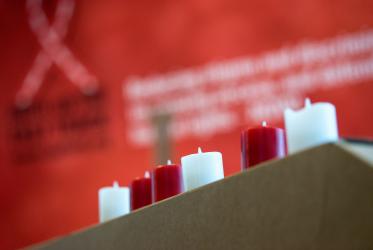*By Claus Grue
For HIV-infected people in Nairobi, the Eastern Deanery Aids Relief Program makes a difference. By providing a quarter of the antiretroviral therapy care, it helps around 26,000 HIV-infected people in the Kenyan capital to live normal lives.
The formula behind this successful operation is spelled “community-based care”. The Eastern Deanery Aids Relief Program works closely with local churches and faith communities at a grassroots level to create effective organisations and systems to support HIV care. Located in the eastern slums of the city it currently runs 14 clinics, employing 390 staff and 1,200 community health workers.
“Community health workers are crucial in our operations,” explains Richard Bauer, Catholic priest and director of Spiritual and Psychosocial Care with the Eastern Deanery Aids Relief Program. All community health workers are from local faith communities and are active participants in their small Christian community.
“Faith is their motivation and source of strength. Faith is hugely important because the majority of Kenyans go to religious service on Friday, Saturday or Sunday. What we are trying to say is that faith goes hand in hand with HIV treatment”, Bauer clarifies.
He exemplifies with a recent visit to the home of a HIV-infected woman, who read the Bible several times a day. By suggesting that she should keep her HIV medicine next to the Bible on the shelf, she would remember to take it every day.
“In three months, her virus became undetectable. She created an interplay between her spiritual beliefs and her health, which supports her treatment. It is about what you believe in and how that can impact – positively or negatively – your health”, Bauer explains.
He firmly believes that a spiritual assessment should be an essential part of quality clinical care and that spirituality can have an impact on treatment compliance.
“Emotional and social drivers of behavior have to be acknowledged”, he says.
The program’s priority now is targeted testing, which means finding those who are most at risk, without stigmatizing them. Sexual partners of current clients and young sexually active adults between 18 and 29 years old, who never have been tested, fall into this category. So do men in general, especially young men. Currently, 70 percent of the program’s HIV-positive clients are women.
“Men, especially working men, are more difficult to reach, because they can’t afford to take the time off needed to go to clinic and get tested. We’ve therefore started clinics for men only, open from 6 am to 8 am and 5 pm to 9 pm, so that they can come before or after work. That has made a difference”, Bauer explains.
In addition, the program has recently begun to implement HIV self testing as an additional testing strategy.
More than three decades of experience of ministry and support for people affected by HIV – of which two decades were in Africa – has convinced him that efforts at community levels are critical.
That was also a main message in his speech at the “HIV among migrants and refugees” workshop in Geneva a couple of weeks ago, which was hosted by UNAIDS, the World Council of Churches (WCC) and the International Catholic Migration Commission.
Turning mercy and compassion into action (WCC press release of 4 March 2019)
“Join forces, work together” – WCC convenes workshop on HIV among migrants, refugees (WCC press release 20 February 2019)
WCC work on Migration and social justice
*Claus Grue is a communication consultant for the World Council of Churches










